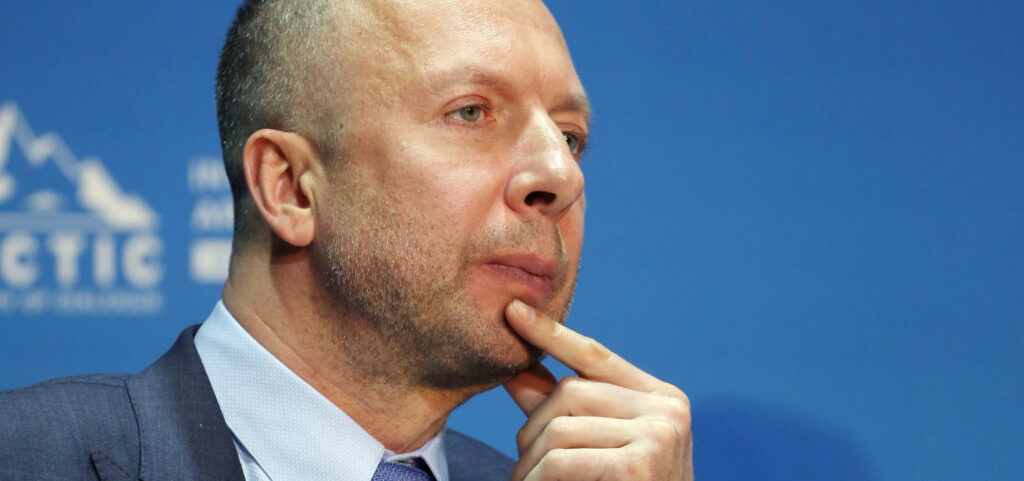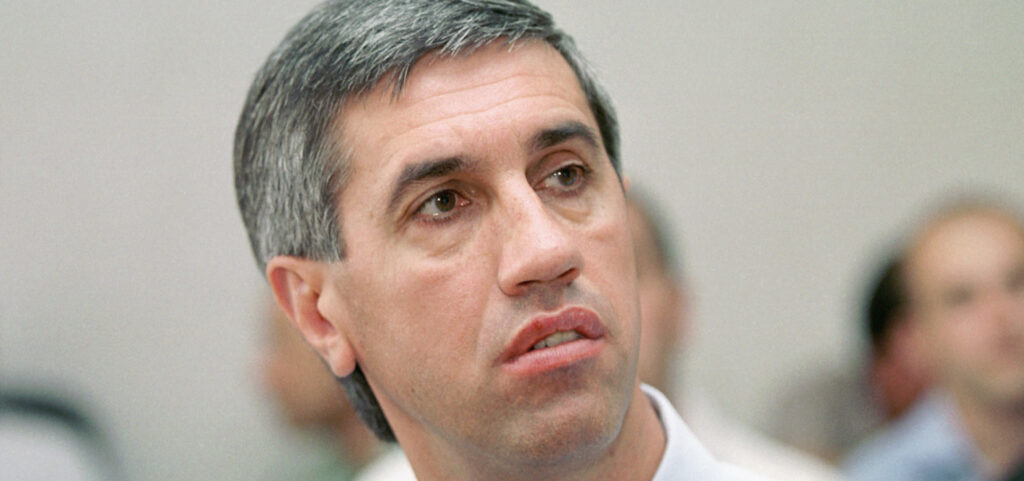
Back to the 1990s?
Hello! This week our top story is on the almost simultaneous suicide of a billionaire and arrest of a mafia leader who were both prominent figures in Russia’s bloody ‘aluminium wars’ of the 1990s. We also look at Russia’s accelerating coronavirus outbreak, and why Putin’s approval ratings are at their lowest level of all time.

Dmitry Bosov, the late coal billionaire
A coal billionaire commits suicide, his former partner with criminal ties gets arrested
As the coronavirus crisis rages, Russians are being distracted by events that seem taken straight from the turbulent 1990s. Billionaire Dmitry Bosov, who owned a stake in Russia’s largest aluminium plant, commited suicide Wednesday. The following day, another of the factory’s co-owners and a legendary figure from the bloody ‘aluminum wars’ of the 1990s, Anatoly Bykov, was arrested on 25-year-old murder charges.
- Bosov, 52, used a Glock pistol, a gift from officials in the un-recognized republic of Southern Ossetia, to shoot himself in his villa outside of Moscow. Investigators believe there was no foul play. Earlier this year, Forbes Magazine estimated Bosov to be worth $1.1 billion. His largest business was coal producer Sibantransit.
- In recent years, Bosov had fallen out with his partners and embarked on (Rus) a conflict with Eduard Khudainatov, a close associate of the powerful Igor Sechin, head of state-owned Rosneft. Khudainatov wanted to buy Sibantransit, but Bosov refused his offer and published an advertisement in several business newspapers that read “Sibantransit is not for sale”. In addition, there were criminal charges pending against one of Bosov’s companies, most of his major business projects had been frozen, and in the U.S. — where Bosov invested in the production of legal marijuana — a former manager was suing (Rus) him for $1 million for labor law violations.
- The final blow, according to those close to Bosov, was the coronavirus pandemic. The billionaire’s friends said he was a “very emotional person”, and had been deeply affected by the outbreak. Locked away in his villa for two months, an acquaintance told Forbes that Bosov “was always yelling: stay home or you will die.”
- While Bosov only became a billionaire in 2020, his career peaked in the 1990s. Back then, Bosov ran the Moscow subsidiary of international trader Trans World Group (TWG), which controlled half of Russia’s metals factories. Together with the founders of TWG — the Ruben brothers and the Cherney brothers — Bosov held 20 percent of Russia’s largest aluminum plant. In 2000, the shares were sold to billionaires Boris Berezovsky and Roman Abramovich for an undisclosed amount. Today, the factory is the prize asset of aluminium producer Rusal, which is owned by billionaire Oleg Deripaska. Rusal was valued at more than $20 billion in its 2010 IPO.

Anatoly Bykov, the former de facto ruler of Krasnoyarsk
- The day after Bosov’s suicide — in an apparently unrelated turn of events — Bosov’s former partner Anatoly Bykov was arrested in the Siberian city of Krasnoyarsk. In the 1990s, Bykov was seen as the criminal boss ruling over the city’s aluminium factory, the biggest in Russia, in which he owned a 10 percent stake. A former PE teacher and boxer, Bykov built ties to local criminal groups that helped leverage his hold on the factory. For several years, he was the de facto ruler of the whole Krasnoyarsk region. Bosov later recalled (Rus) that one of Bykov’s criminal partners organized an assassination in 1995 targeting him and two other employees of TWG, future billionaires Vladimir Lisin and Deripaska. Grenade launchers were to be used to kill the three men, who were travelling together to a shareholder meeting — but Bykov had the attack called off at the last moment.
- In the early 2000s, Bykov’s influence was curtailed, and, in 2002, he was sentenced to 6.5 years in prison for ordering a contract killing (although he was freed in an amnesty). Bykov faces similar charges now: he is accused of ordering the 1994 murders of two mobsters unhappy with their share of the profits in a joint business.
- The new criminal case against Bykov is believed to be linked to his political ambitions. This year marks 15 years since Bykov’s last criminal charges, which means he is eligible to run for office. Indeed, he had already begun a campaign for a seat in the local parliament with slogans (Rus) accusing Moscow of acting like a colonialist slave owner in relation to the Krasnoyarsk region.
- Despite trying, journalists have not found any direct — or indirect — connections between Bosov’s suicide and Bykov’s arrest.
Why the world should care
The criminalization of the Russian economy in the 1990s is something the current elite would like ordinary people to forget. But the story of Bosov and Bykov shows it was not so long ago, and there remain many living witnesses.
Putin’s approval rating hits lowest level in 20 years
Many world leaders have seen a surge in their approval ratings during the coronavirus pandemic as fear drives people to rally around their governments. Russian President Vladimir Putin has experienced the opposite trend. Unable to seize the political initiative, Putin’s approval rating fell to historic lows in March and April.
- Weakening support for Putin has been identified both by state-run polling agency Russian Public Opinion Research Center (VTsIOM), and by the independent Levada Center. According to a March VTsIOM poll, 28.3 percent of Russians said they trust Putin (in response to a question “Which politicians do you trust?” that did not offer names) — a new record low. Even during the highly unpopular pension reforms pushed through in 2018, this indicator never went below 30 percent.
- Similarly, a Levada Center poll showed Putin’s approval rating fell from 63 percent in March to 59 percent in April. This indicator has never before dropped below 60 percent — the last time it even neared that level was in 2013, just ahead of the Kremlin’s decision to annex the Ukrainian region of Crimea.
- Sociologists said Putin’s popularity problems were being caused by fears of a looming economic crisis. “People are losing faith that the country’s leadership can do something for them,” said Lev Gudkov, the head of Levada Center.
- The Kremlin is also concerned about Putin’s falling ratings. One of the first acts of censorship by Vedomosti’s new leadership was to try and ban journalists from using polls conducted by the Levada Center. Editor-in-chief Andrei Shmarov told employees that this instruction had come straight from the Kremlin.
Why the world should care
For the first time in 20 years, Putin is facing an economic downturn and falling approval ratings. More anti-crisis spending by the Russian government could help rectify the situation, but this looks unlikely to happen: the Kremlin wants to save money for the post-2021 period when it will have to boost Putin’s rating ahead of the 2024 presidential election.
Moscow extends lockdown as epidemic accelerates
The number of new COVID-19 cases in Russia grew rapidly this week, though the country’s death rate remains one of the lowest in the world. The lockdown in Moscow was extended to the end of May, but the authorities are reopening factories and construction sites as city officials fear unrest among migrant workers left desperate without work.
- After a period of stabilization at the end of April, the spread of coronavirus this week took off again. Since Sunday, there have been more than 10,000 new cases every 24 hours. By Friday, Russia had 188,000 coronavirus infections and was in fifth place globally, ahead of France and Germany. Media outlet Mediazona noted Thursday that Russia’s epidemic has surpassed the growth rates recorded by Italy in mid-April.
- Despite this, the number of reported COVID-19 deaths remains remarkably low — 1,723 people. Compared to the number of infections, Russia’s death rate is five times lower than Germany and 15 times lower than France. Russian officials explain this difference as a result of the country’s mass testing policy.
- Russia’s May holiday period will end Tuesday. The authorities had planned to announce a loosening of the lockdown at this point, but the worrying numbers meant Moscow extended its lockdown to May 31. The capital has more than half of all cases in Russia. For now, lockdown measures are only growing stricter: Moscow also introduced mandatory mask wearing in public places from May 12.
- The only easing greenlighted by the authorities was to allow factories and construction sites to operate again from Tuesday. The powerful construction lobby played a significant role in this decision, but, more importantly, officials fear what will happen if Moscow’s 2 million migrant workers, deprived of an income, become even more desperate than they are already.
- Businesses will have to pay for the opportunity to go back to work — Moscow City Hall is requiring companies to test 10 percent of their employees every two weeks for coronavirus. The Bell calculated this will require 1 million tests to be performed over 6 weeks at a total cost of at least $15 million.
Why the world should care
While coronavirus appears to be receding in much of Europe, Russia is going in the opposite direction. Along with the United States, Russia is the last major world economy where the spread of COVID-19 continues to be rapid.




